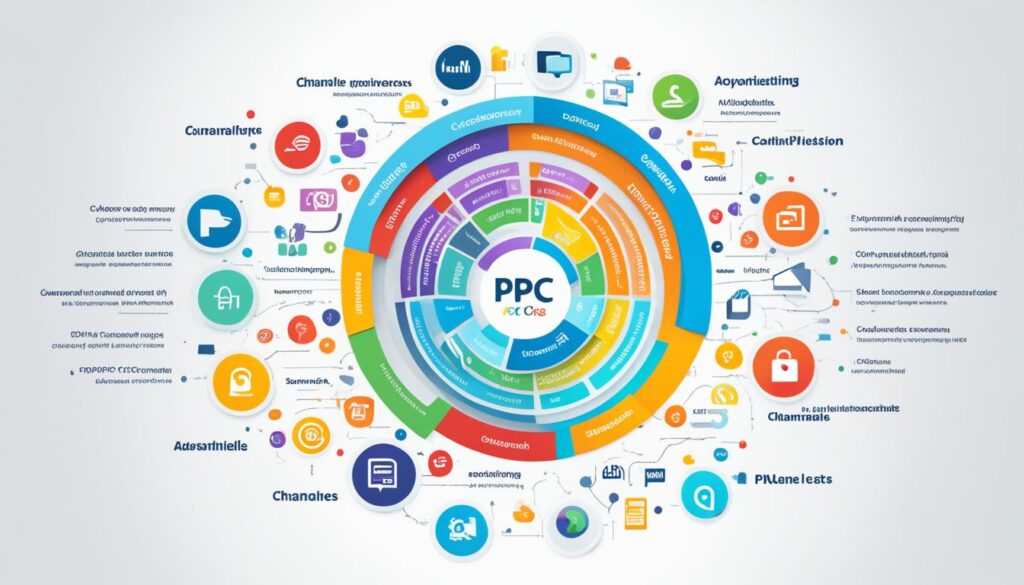
The world of digital marketing can seem big and scary. But PPC (pay-per-click) advertising management stands out. This guide will teach you everything you need to know. You’ll learn to make the most of your PPC ads. And you’ll reach your advertising goals effectively.
If you’re just starting or have some experience, this is for you. We’ll look at setting goals and finding the right keywords. Plus, we’ll talk about writing ads that catch people’s eyes and setting the best bids. You’ll also learn how to target the right people. And how to bring it all together with other marketing methods.
When you finish this guide, you’ll know how to run great PPC campaigns. This will boost your business’s online presence and success. Let’s start and make your PPC advertising management shine.
Key Takeaways
- Discover the fundamental principles of effective PPC advertising management to drive tangible results for your business.
- Learn how to set strategic campaign goals and establish key performance indicators (KPIs) to measure the success of your PPC efforts.
- Leverage advanced keyword research techniques to identify the most relevant and high-performing search terms for your PPC campaigns.
- Craft compelling ad copy that captures the attention of your target audience and encourages them to take the desired action.
- Optimize your bidding strategies and audience targeting to maximize the efficiency and effectiveness of your PPC campaigns.
Understanding PPC Advertising Management
Pay-per-click (PPC) advertising lets advertisers pay when someone clicks their ad. This helps them get the right people to see their site or content. We will talk about the basics of PPC and why it’s good for all kinds of business.
What is PPC Advertising?
PPC ads show up on search pages or online sites. Advertisers pay only when their ad is clicked. This means they can show their stuff to people interested in what they offer. It’s a great way to find new customers.
Benefits of PPC Advertising
PPC ads give businesses a quick way to be seen online. They can choose who sees their ads, like by keywords or where people live. Plus, they can see how well their ads do and change things to get better results. This helps them make smarter choices with their ad money.
Key Platforms for PPC Campaigns
Google Ads and Microsoft Advertising are the big players in PPC. Google Ads offers many ad types, like search and video ads. Microsoft Advertising uses Bing, a search engine for a different group of users. Both are strong ways to reach people online.
Knowing how PPC ads work and the advantages they bring, businesses can make a plan. This plan will help them get more visitors, find new customers, and make the most of their money.
Setting Up Your PPC Campaign Goals
Finding clear and measurable goals is key for any top PPC advertising management. Be sure to set your advertising objectives and pick the right key performance indicators (KPIs) to follow and judge their success. Before you start your campaigns, this step is very important.
Defining Your Advertising Objectives
Begin by picking your main PPC campaign goals. Do you want to grow brand awareness? Or get more leads, sales, or website traffic? Knowing these will help focus your PPC work with the overall business plan. It makes sure your ad money leads to the right results.
Establishing Key Performance Indicators
Once your advertising objectives are clear, set the key performance indicators (KPIs). These KPIs will let you watch and measure your PPC campaigns. Important KPIs include:
- Click-through rate (CTR)
- Cost-per-click (CPC)
- Conversion rate
- Return on ad spend (ROAS)
Keep an eye on these KPIs all the time. This will help you understand how your PPC campaigns are doing. Then, you can make smart choices to better your strategy for more impact.
Keyword Research for PPC Campaigns
Good PPC keyword research builds the base for winning ad campaigns. When you find the best keywords, your ads will target the right people. This gets more customers to engage with your business.
Identifying Relevant Keywords
Begin by knowing who you want to reach. Think about what they might be searching for. List some words that fit your business and catch people’s interest.
Next, find more words using online tools. These tools help you see what other words people often search for. You might find some good ones that not many others are using.
Utilizing Keyword Research Tools
Use tools like Google Ads Keyword Planner, SEMrush, and Ahrefs to learn more. They show you how often words are searched, how hard they are to use, and their costs. This info helps you pick the best words for your ads.
Analyzing Keyword Competition
Know what you’re up against. Look at what others are doing with those same words. Understanding this can help you pick words that give your ads a better chance to be seen.
Doing thorough PPC keyword research will make your ads better. They’ll reach the right people, leading to more success with your ads.
Crafting Compelling Ad Copy
Crafting catchy PPC ad copy is key to effective ad copywriting. Your headlines matter a lot for your PPC campaigns to work. Write headlines that catch people’s eyes. Make them see your top unique selling propositions. This way, more people will click your ads and go to your site.
Writing Attention-Grabbing Headlines
The headline is a potential customer’s first look at your ad. Make it fun and convincing. Talk about what makes your product or service special. Use words your customers love. Add keywords they look for. And tell them why you are better than others.
Highlighting Unique Selling Propositions
Your PPC ad copy should shout out why you’re the best choice. Talk about the cool things your product does. Tell them how it helps. Show them why it’s better than the rest. This way, you grab their attention and they learn more.
Incorporating Call-to-Actions
Strong call-to-actions (CTAs) are a must to get people to do something. Make CTAs that are easy to understand. Encourage your audience to buy or learn more. Use words that make them feel they need to act now. This helps turn clicks into sales or other actions.
PPC advertising management
Good PPC management picks the best bidding plan. It tweaks ads to get more sales. Knowing how PPC bidding works and conversion tips can boost your ads.
Choosing the Right Bidding Strategy
For PPC bidding, there are many ways to bid. You can do it by hand or use smart tools. Each way has good and not-so-good parts. Find what fits your plan and goals best.
Many like CPA bidding to get more buys within a set budget. Picking the right way depends on your needs and what you aim to achieve.
Optimizing Ad Campaigns for Conversions
After picking a bid plan, it’s time to make ads better for sales. Try different ads with A/B tests. Make sure landing pages are awesome to guide visitors right.
Use CRO to check and tweak the path customers take. Keep an eye on what works best. This way, your PPC managing gets better over time.
Audience Targeting for PPC Campaigns
Good audience targeting is key for PPC ad success. It helps your ads reach the right people. This means more clicks, sales, and value for your money.
Demographic Targeting
With demographic targeting, you can aim your ads at certain groups. This might be by age, gender, or how much they earn. You can then make sure your ads speak right to them. Doing this makes your ads more interesting and appealing to those viewers.
Geographic Targeting
Geographic targeting focuses on where people are. You can aim at a whole country or just one city. It’s great for businesses focusing on local areas. It makes sure your ads are seen by the right nearby people. This boosts how well your ads do.
Interest-Based Targeting
This type looks at what people like online. It targets those who have shown interest in similar things. This means they are more likely to like your ad. It makes your ads more relevant and powerful. So, your ads get more clicks and do better.

Tracking and Analyzing PPC Campaign Performance
It’s important to check how your PPC campaign is doing. This lets you keep your ads working well. You check out important metrics and what the data shows. Doing this helps you find ways to do better and choose what to fix in your ads.
Monitoring Key Metrics
Keep an eye on numbers like how many times your ad shows (impressions), how often people click it (clicks), and more. These performance analytics tell you if your ads are working. You can see if changes you make to how you manage your ads are helping.
Interpreting Campaign Analytics
Looking closer at the data can show you how to do better. See which ads or keywords are not doing as well. Then, figure out what to change in your strategy. You might play with who you target, how much you bid, or what your ads say.
Identifying Areas for Improvement
After studying your PPC campaign’s insights, focus on what can make a big difference. Maybe you need better keywords, different bidding plans, or new ads. Keep making your PPC ads better to get the most from your ads.
Optimizing Your PPC Campaigns
Keep making your PPC ads better for the best results. This part shows you key ways to improve your campaigns.
Adjusting Budgets and Bids
It’s key to keep your PPC budget and bid amounts updated. This keeps them efficient and profitable. Watch how your ads perform to see what changes you need to make. You might need to spend more on good keywords or cut back where you see poor results.
Refining Keyword Lists
Success in PPC ads starts with picking the right keywords. Look at your keyword data a lot to see what works. If some keywords are not doing well, get rid of them. Add new ones that are a better fit. This helps your ads reach the right people.
Testing Ad Variations
To do well in PPC, keep testing your ads. Try different ad versions to see what pulls in more customers. This can include different headlines or messages. Tests like A/B testing show you what works better. Then, you can make your ads even better.
Using these strategies will keep your PPC ads sharp and in line with your goals. Always adapt and use data to make smart choices. This is how you stay ahead in PPC advertising.
Integrating PPC with Other Marketing Channels
Maximizing your PPC ads means mixing them with other marketing ways. Using a wide strategy boosts how well your PPC ads work. It helps your marketing overall succeed more.
Aligning with Social Media Strategies
Linking PPC with social media ads is powerful. It uses ads on Facebook, Instagram, and LinkedIn to hit target audiences better. Doing this boosts brand notice and finds more good leads.
Coordinating with Email Marketing Efforts
Mixing PPC with email marketing is smart. It keeps past fans interested, aiming to turn them into buyers. This link helps squeeze out more sales and keeps you in their mind.

Conclusion
This guide has shared important ideas for great PPC ads. It talked about learning PPC basics, setting campaign goals, and choosing the right keywords. It also covered writing good ad copies, picking the right bids and targets. Plus, it looked at checking how well ads do and linking PPC to other marketing.
The tips here help advertisers make the most of PPC ads for big growth. By using the advice in this guide, companies can make their PPC campaigns better. This will help them do well against others in the online world.
Want to make your brand big, get more leads, sell more online, or have more visitors? Then, you should follow the steps in this guide. They show how to use data and keep improving your PPC ads. This will give better results and make your brand strong for the future.
Combine PPC with social media and email marketing. This combo boosts your ads’ power. It leads to a more successful marketing strategy overall.


